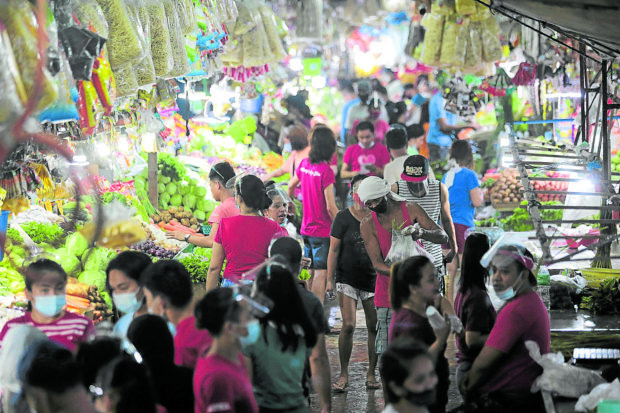
LAST-MINUTE SHOPPING People flock to Commonwealth Market in Quezon City on Thursday for last-minute shopping for the traditional Christmas Eve repast. They forget physical distancing, despite a plea from the local government for them to observe public health measures to prevent a rise in coronavirus infections after the holidays. —GRIG C.MONTEGRANDE
MANILA, Philippines — COVID-19 testing laboratories have been told to be ready for a rise in test demand after the holidays due to an expected surge in new coronavirus infections. Health and trade officials led by Health Secretary Francisco Duque III visited licensed testing laboratories in Makati City on Wednesday.
One of the laboratories they visited, Health Metrics, mainly caters to inbound and outbound merchant mariners and currently runs an average of 70 COVID-19 tests a day.
Health Metrics president Antonio Abaya said the laboratory could do up to 500 tests per shift and could increase the number of shifts if needed.
Duque thanked the laboratories for operating during the holidays.
“I urge all laboratories to aid the government in meeting the increased testing demand that comes with the observed increase in cases,” he said.
6.2 million tests
Currently, there are 192 licensed COVID-19 testing laboratories nationwide. They have conducted more than 6.2 million tests so far, according to the Department of Health (DOH).
Of the licensed laboratories, 147 are real-time RT-PCR laboratories, while 45 are GeneXpert laboratories.
Both types of laboratory process reverse transcription-polymerase chain reaction (RT-PCR) tests, which the DOH considers the gold standard in confirming coronavirus infection. They differ only on how the samples are processed.
The DOH said about a hundred more laboratories were applying for accreditation, of which 55 were nearing the final accreditation stages.
As of Dec. 12, 6,236,830 COVID-19 tests for 5,874,023 people have been conducted, and 8.7 percent of the tests were positive for the new coronavirus.
On Thursday, the DOH logged 1,776 additional coronavirus infections, bringing the overall number of confirmed COVID-19 cases to 465,724.
Quezon City reported the most number of new infections (128), followed by Davao City (121), Rizal province (94), Samar province (57), and Bulacan (56).
The DOH said 533 more patients had recovered, raising the total number of COVID-19 survivors to 430,490. But the death toll rose to 9,055 with the deaths of seven more patients.
The deaths and recoveries left the country with 26,179 active cases, of which 81.4 percent were mild, 10.3 percent asymptomatic, 0.34 moderate, 2.7 percent severe, and 5.2 percent critical.
Fighting surge in QC
Meanwhile, the Quezon City government on Thursday urged residents to observe public health measures during the Christmas and New Year celebrations to prevent a rise in new COVID-19 cases after the holidays.
Citing data from the DOH, the city government said an average of 120 cases were recorded from Dec. 16 to 21. The number had increased from the week before, when around 90 cases were recorded every day from Dec. 9 to 15.
The reproduction rate of the virus from a single case (R0, pronounced R naught) has also increased in December. It was logged at 1.54 on Sunday, Rolly Cruz, the city’s chief epidemiologist, said on Thursday.
In November, the average R0 in the city was 0.74.
Earlier, experts said an R0 figure above 1 signaled an upward trend in infections. The World Health Organization considers 0.5 as the ideal R0.
As cases surged, Quezon City ramped up testing in recent days. It did more than 2,190 a day from Dec. 14 to 20.
The local government also intensified contact tracing, according to city COVID-19 task force chief Joseph Juico. —WITH A REPORT FROM NIKKA G. VALENZUELA INQ